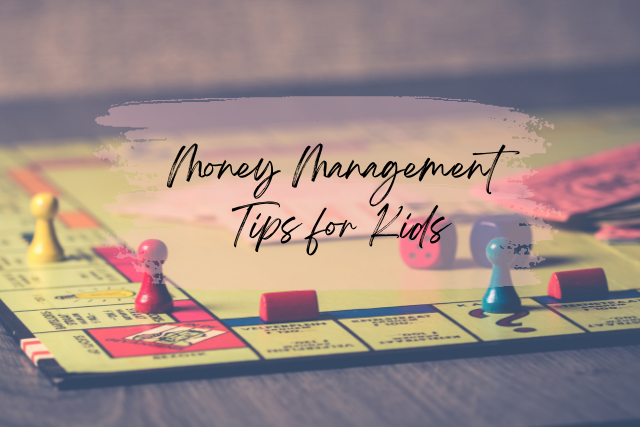Managing money is a skill that is important for people of all ages. For children, learning how to save, spend, and budget wisely can lay the foundation for a lifetime of financial success. Teaching our children how to be financially literate is one of the most important lessons we can teach them. This blog post will discuss some of the benefits of teaching children about handling finances and some tips on how to do it effectively.


What is Financial Literacy and Money Management?
“Financial literacy is the possession of skills that allows people to make smart decisions with their money.”
From Dave Ramsey’s – What is Financial Literacy?
“Financially literate individuals use financial knowledge to make better financial decisions. From everyday spending to long-term financial planning, effective money management means using money to further your personal goals – no matter what they are.”
From Financial Literacy 101
As any parent knows, raising children is a costly endeavour. Children require a never-ending stream of supplies, clothing, and food from the moment they are born. As they grow older, the costs increase, with schooling, extracurricular activities, and entertainment eating into the family budget.
Given the high cost of raising kids, it’s no wonder that many parents worry about their children’s future financial prospects. However, one way to help ensure your children’s economic success is to teach them about money management from an early age.
Disclaimer: I am not a licensed financial analyst /advisor. All information found here is based on my personal research, readings, experiences, and personal point of view. I do not represent any financial company, and the information I am sharing is only for informational purposes and not to be taken as professional advice.
As an Amazon Associate, I may earn from qualifying purchases when you click on the links; at no additional cost to you. Please see the disclosure policy for more information.


What age is appropriate for financial education?
A discussion of financial education naturally raises when such instruction should begin. Some people feel that children as young as five or six can start to learn basic concepts like saving and spending. Others argue that financial education should not begin until kids are older and better understand numbers and mathematical concepts.
There is no easy answer, but there are a few things to consider.
First, it is vital to tailor the level of instruction to the age group. Young kids may not be able to grasp complex investment strategies, but they can still learn the basics of responsible spending and saving.
Second, timing is also crucial. It may be helpful to start teaching financial concepts when kids are beginning to earn their own money from allowance or part-time jobs.


The benefits of teaching children about money management
Most adults, including myself, will admit that they wish they had learned more about money management when they were children. After all, managing finances is a crucial life skill and one that can be difficult to understand later in life. There are several benefits to teaching our children about handling finances early.
They will be able to develop good habits that will serve them well into adulthood. Teaching kids how to handle money can give them the skills to make responsible financial decisions when they are adults.
In addition, children who understand the basics of money management will be less likely to fall into debt later in life.
Finally, parents can help instill a sense of responsibility and financial literacy. They learn that they need to be careful with their spending and that they need to save for the future. You can help them understand the importance of preparing for a rainy day, living within their means, and investing for the future. These are all important lessons that will serve them well throughout their lives.
Related Post: 15 Great Strategies to Survive on a Low-Income Budget


How to teach kids about finance and good money habits
Here are a few tips on how to get started:
- Explain what money is and how it works.
While it may seem like a no-brainer, your children must understand the basics of money before you start teaching them how to manage it. Help them know where it comes from, what it’s used for, and why we need to be careful.
The best way to teach little children about the value of money is when you are playing with them. You can play Monopoly or Monopoly Jr. You can also play pretend “shop” or “grocery” so they can buy toys or food in exchange for play money. Better yet, you can show them that you are paying money in exchange for purchased items at a grocery store.
2. Teach them how to save.
Help your children set up a savings account and show them how to deposit money into it regularly or whenever they receive money gifts. Explain why it’s essential to save and help them set their savings goals. Little ones, they may choose to save up for a toy or put some money into a piggy bank for long-term savings. Saving teaches our children the value of delayed gratification. As they get older, you can teach them about investing and budgeting.


3. Teach them about budgeting.
Once your children have a handle on saving, you can teach them about budgeting. A great way to teach kids about budgeting is to give them a regular allowance to manage independently. Help them set up a simple budget and stick to it. Help them understand that there are some things that we need and some things that we want and that we have to be careful with our money to afford the things that we need.
4. Lead by example: The best way to teach
One of the most important things you can do is model good money management behaviour yourself. If you constantly spend money on unnecessary things, your children will think that this is normal behaviour. Instead, show them how to be frugal and save money when possible. If parents are mindful of their spending and saving habits, their children will be more likely to follow suit.
5. Make it fun.
Children are more likely to retain information if they are enjoying the process. Let them experience frugal spending on fun things as a reward for learned money habits. Several excellent resources can help you make learning about money management fun for your children. Most banks’ websites offer great ideas about financial literacy for kids. Watching finance for kids videos on Youtube and reading finance books are great ways to learn.


Takeaway
No matter your financial situation, teaching your children how to be financially literate is one of the most important lessons you can teach them.
These are just a few tips to get you started on teaching your children about money management. The sooner you start, the better. We can help our children become responsible and savvy money managers with a little patience and effort.
What other tips for teaching children about financial literacy and money management? Please share them in the comments below!










Very helpful article! Thank you for sharing this.
Thank you Romie!
This is such a great article! I totally agree that this is an extremely important topic. As a teacher, I’ve started incorporating financial literacy into my classes for even 2nd Graders. They can take in and understand so much more than people expect and I’d rather have them learn & try new things in a safe environment than in the harsh real world!
Leading by example is one I got from my mom and her always reminder. Great tips here
That’s great! These littles one would definitely be financially literate then. Thank you for teaching them.
Great article thanks . It’s important to teach children about finance
Glad you liked it
Such an important and relevant topic! Thanks for the tips!
Thank you!
Pingback: Simple Strategies for Financial Freedom: How We've Seen an Improvement in Just Two Years - Finding Joy with less
Pingback: Six Common Personal Finance Misconceptions that you need to dispel - Finding Joy with less
Teaching children about finance and money can be challenging. Doing it in more practical, simple and fun ways may help.
Thanks for your thoughts! Since we have big travel goals, we have been working hard with our children on saving and looking at the cost/value of products.
Teaching our kids how to manage money is so important! I never learned, so this is a must for me. I involve them in our budgeting, talk with them about what we are saving for, and teach them how to be intentional with their spending. Great post!
Great post! This is so important! I wish they taught us in school about managing money, debt, credit cards, and building credit – but it’s up to us as parents. These are some great tools! Ty!
Great article with good tips. Definitely something to discuss and start teaching them early
Totally agree about making it fun for kids. As parents we don’t realize how easy it is to implement simple habits that can be so important.
Great ideas here especially with using board games and making it fun!
Glad you liked it!
Indeed 🙂
Thanks for reading 🙂
So true! Thank you.